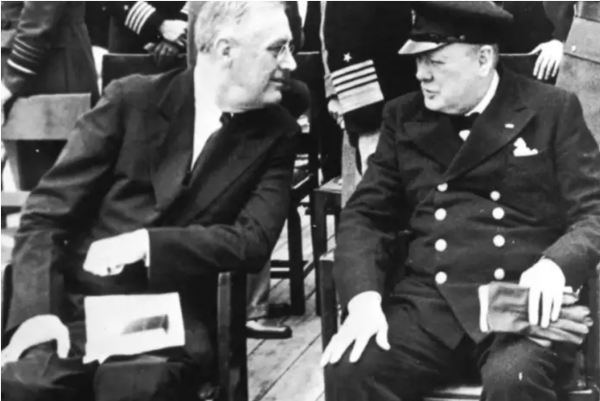
By Dr Megan Dee, Lecturer in International Politics, University of Stirling
Donald Trump makes his first official visit to the UK as US President this week. The choice of date and portents of bad luck (Friday 13th) aside, the visit is a critical signifier of the UK and America’s “special relationship” and will say much of the ongoing, indeed seemingly special, status of the UK and America’s relationship moving forward.
Whilst the detailed agenda remains unclear, what is certain is that the visit will include much in the way of political showmanship. For President Trump, this visit – already once delayed – is an opportunity to show to both domestic opponents and hesitant European partners not just his clear credentials as head of state (a visit to the Queen is widely reported), but his strength and resolve in the face of widespread outcries over his domestic, trade, and security policies. For the Prime Minister, the visit presents a much-needed chance to show her own statesmanship along with a refreshed international outlook at a time of beleaguered Brexit negotiations, cabinet infighting, and political back-stabbing. Expect much, therefore, in the way of Trump-May public hand-shaking and familial hugs and a renewed emphasis on how special this special relationship is.
Take a look behind the political showmanship, however, and at the heart of this visit brews some very real and increasingly contentious issues for both parties. Transatlantic relations are at one of the lowest ebbs in over half a century. The special relationship itself has never been so publicly strained, thanks to the voluble and oftentimes unhelpful Twitter commentary from President Trump (think London a ‘war zone’, and retweeting far-right Britain First posts…), only exacerbated by formal reprimands by the Prime Minister (most recently on the ‘inhumane’ detention of migrant children by the American government).
For America, the majority concern is invariably Brexit, which raises apprehension over the UK’s standing in Europe and what that might mean for Transatlantic relations. Whilst Brexiteers widely proclaimed that Brexit would raise the UK’s global standing and enhance the special relationship between the UK and America, for America the UK has been special precisely because it is a member of the EU and has served as a crucial pro-Atlanticist and interlocutor between America and Europe. Remove the UK from the EU and America’s principal champion on the European continent becomes just another European neighbour. The President will thus be looking for much in the way of reassurance from the Prime Minister that, amidst the Brexit mayhem, the UK will remain a useful partner, most especially when it comes to matters of security.
For the UK, the issues of concern are more extensive and pronounced. Not only will the Prime Minister be pushing hard on the need to secure a UK-US comprehensive free trade and investment agreement as swiftly as possible post-Brexit – no mean feat considering President Trump’s increasing bullishness in his trade policy – but she will also be looking for her own assurances that America will itself remain committed to security in the transatlantic region, and thus to NATO.
President Trump has been prolific in his proclamations that NATO allies need to spend more on defence to uphold their obligations to the organisation and not rely solely on America to do the heavy lifting. Such proclamations further hint at a willingness to withdraw America from the organisation should the President feel allies aren’t doing enough – and such hints are no longer considered mere threats. Under President Trump, America has retreated significantly from multilateral treaties, organisations and obligations and NATO may yet be another casualty of a growing American isolationism.
The UK will also be seeking more solidarity from America in the face of a pressing Russia threat. President Trump’s largely unhelpful recent comments that meeting Putin would be “easier” than his UK visit, coupled with his previous calls for Russia to be readmitted to the G7 (to the dismay of all other members including the UK), are indicative of a more neutral stance by American towards its old adversary. And yet such neutrality is poorly timed and has the potential of unravelling the Prime Minister’s securing of widespread international support against Russia following the Skripal poisoning.
What will no doubt be underlying the Prime Minister’s own private agenda for Chequers, meanwhile, is the lengths she will ultimately go to maintain the special relationship and continue to champion America under its current Administration. Under the Trump Presidency, America remains the most powerful nation in the world. But today it is unpredictable. The rhetoric flowing from the President’s Twitter-feed alone would cause even the most sanguine of national leaders to cringe in consternation. More than just his Twitter feed, though, the Trump administration is doing and saying much to challenge what we have come to recognise as the status quo of the liberal international order – a security order essentially underwritten by America, global free trade reinforced by multilateral rules that are (generally) respected by all, and an America willing to promote and protect liberty, democracy and the rule of law – all are now coming into question. And our confidence is shaken.
Scrape back the political glad-handing, publicity and hype of the President’s visit, therefore, and the contentions are stark. Frank and honest discussions may yet prove useful, but it will take more than public displays of affection to resolve the strife brewing at the heart of this special relationship.

